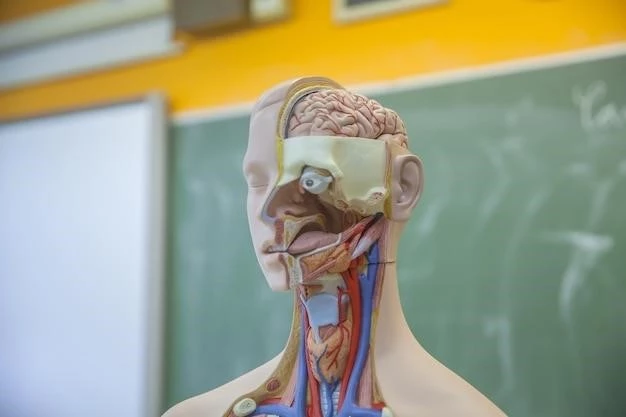Disease ⎼ Hypogonadism, Mitral Valve Prolapse, and Mental Retardation
Introduction
Welcome to this comprehensive article exploring the relationship between hypogonadism, mitral valve prolapse, and mental retardation․ Hypogonadism refers to the deficiency of sex hormones from the gonads․ Mitral valve prolapse is a heart condition involving the improper closure of the valve․ Mental retardation, also known as intellectual disability, presents cognitive impairments․
Understanding the individual impacts of hypogonadism, mitral valve prolapse, and mental retardation is crucial in managing these conditions effectively․ Furthermore, examining the interplay among these three disorders can provide valuable insights into the complexities of their coexistence․ This article will delve into the associations between these conditions, their impact on cognitive function, complications, treatment approaches, and advancements in research․
Hypogonadism
Hypogonadism, a condition characterized by deficient sex hormone production from the gonads, can manifest as inadequate levels of testosterone in males or estrogen in females․ Symptoms may include decreased libido, infertility, fatigue, and muscle weakness․ Primary hypogonadism affects the gonads directly, while secondary hypogonadism involves hypothalamic or pituitary deficiencies․
Diagnosis of hypogonadism involves hormone level testing, physical examinations, and imaging studies to identify the underlying cause․ Treatment options depend on the type and cause of hypogonadism and may include hormone replacement therapy, lifestyle modifications, and addressing any underlying conditions contributing to the deficiency․ Managing hypogonadism is essential to improve quality of life and prevent associated complications․
Mitral Valve Prolapse
Mitral valve prolapse is a heart condition where the valve between the left atrium and ventricle does not close properly․ This can lead to blood flowing back into the atrium, causing symptoms like palpitations, fatigue, and shortness of breath․ Most cases of mitral valve prolapse are benign and do not require treatment․ However, in severe cases where complications like mitral regurgitation occur, intervention may be necessary․
Diagnosis of mitral valve prolapse involves a thorough medical history, physical examination, and imaging tests such as echocardiography․ Treatment may include medications to manage symptoms and prevent complications, while severe cases may require surgical repair or replacement of the valve․ Regular monitoring and lifestyle modifications are key in managing mitral valve prolapse and ensuring optimal cardiac function․
Mental Retardation
Mental retardation, clinically referred to as intellectual disability, is characterized by limitations in intellectual functioning and adaptive behaviors․ Individuals with mental retardation may have difficulties with communication, social skills, and daily living tasks․ The condition can arise from genetic factors, prenatal exposure to toxins, or brain injuries․
Diagnosis of mental retardation involves standardized testing to assess intellectual and adaptive functioning levels․ Treatment aims to provide support services tailored to the individual’s needs, which may include special education, counseling, and therapy․ Early intervention and ongoing support are crucial in optimizing the individual’s potential and quality of life․ Understanding the specific challenges faced by individuals with mental retardation is essential for effective management and promoting independence․
Relationship between Hypogonadism and Mitral Valve Prolapse
While hypogonadism and mitral valve prolapse are distinct conditions affecting different organ systems, research suggests a potential link between the two․ Studies have shown that individuals with hypogonadism, especially men with testosterone deficiency, may be at a higher risk of developing mitral valve prolapse․ The mechanisms underlying this association are complex and multifactorial․
Hormonal imbalances and altered cardiovascular functions in individuals with hypogonadism may contribute to the development or exacerbation of mitral valve prolapse․ Understanding this relationship is important in clinical practice to ensure comprehensive evaluation and management of patients with these coexisting conditions․ Further research is needed to elucidate the precise interactions between hypogonadism and mitral valve prolapse, paving the way for improved therapeutic strategies and patient outcomes․
Association between Mitral Valve Prolapse and Mental Retardation
Exploring the potential association between mitral valve prolapse and mental retardation is crucial in understanding the complex interplay between cardiac and neurological health․ While these conditions primarily affect different systems – the heart and the brain, respectively – emerging research hints at a possible link between them․
Clinical observations have suggested that individuals with certain genetic syndromes associated with mental retardation may also have a higher prevalence of connective tissue disorders, including mitral valve prolapse․ These genetic links may pave the way for further investigations into shared molecular pathways or genetic susceptibilities that contribute to the co-occurrence of these conditions․
Interplay among Hypogonadism, Mitral Valve Prolapse, and Mental Retardation
The intricate interplay among hypogonadism, mitral valve prolapse, and mental retardation presents a complex clinical scenario requiring a multidisciplinary approach․ While these conditions primarily affect distinct systems – the endocrine, cardiovascular, and neurological systems – their potential interactions emphasize the need for comprehensive evaluation and management strategies․
Studies investigating the intersection of these disorders are limited, but the presence of shared genetic predispositions or biochemical pathways cannot be overlooked․ Understanding how hypogonadism, mitral valve prolapse, and mental retardation may influence each other’s progression or symptoms could provide valuable insights into personalized treatment plans and preventative measures․ Further research is essential to unravel the intricate relationships among these disorders and optimize patient outcomes․
Impact on Cognitive Function
The impact of hypogonadism, mitral valve prolapse, and mental retardation on cognitive function can vary significantly․ Hypogonadism, characterized by hormonal deficiencies, may influence cognitive processes such as memory, attention, and executive functions․ Mitral valve prolapse, while primarily a cardiac condition, can sometimes lead to psychological symptoms affecting cognition․
In individuals with mental retardation, cognitive impairments are a hallmark feature, affecting intellectual functioning and adaptive behaviors․ The interplay of these conditions can further complicate cognitive function, potentially exacerbating challenges in learning, memory, and decision-making․ Understanding the cognitive impact of hypogonadism, mitral valve prolapse, and mental retardation is essential in providing holistic care and support for individuals dealing with these complex health issues․
Complications and Long-Term Prognosis

The complications and long-term prognosis of hypogonadism, mitral valve prolapse, and mental retardation can significantly impact the overall health and well-being of individuals affected by these conditions․ Hypogonadism, if left untreated, can lead to infertility, osteoporosis, and cardiovascular risks․
Mitral valve prolapse may progress to more severe valve issues like mitral regurgitation, increasing the risk of heart failure and arrhythmias․ Mental retardation poses challenges in various aspects of life, including education, employment, and social interactions․ Long-term outcomes for individuals with these conditions depend on early diagnosis, appropriate management, and access to comprehensive care․
Treatment Approaches
The treatment approaches for hypogonadism, mitral valve prolapse, and mental retardation aim to address the specific needs and challenges associated with each condition․ For hypogonadism, hormone replacement therapy can restore hormonal balance and alleviate symptoms․ Lifestyle modifications such as exercise and a healthy diet are also recommended․
In the case of mitral valve prolapse, treatment may involve medications to manage symptoms and prevent complications․ Severe cases may require surgical intervention to repair or replace the valve․ Individuals with mental retardation benefit from tailored support services, education programs, and behavioral therapies to optimize their cognitive and adaptive functioning․ Multidisciplinary care involving endocrinologists, cardiologists, neurologists, and mental health professionals is essential for comprehensive management․
Research and Advancements
Ongoing research and advancements in the fields of hypogonadism, mitral valve prolapse, and mental retardation hold promise for improving diagnostic methods, treatment options, and overall outcomes for affected individuals․ Studies exploring the genetic basis of these conditions, as well as potential biomarkers for early detection, are expanding our understanding of disease mechanisms․
Advancements in medical technology, such as minimally invasive surgical techniques for mitral valve disorders and novel therapies for hormone replacement, are enhancing treatment modalities․ Additionally, research focusing on interventions to enhance cognitive function and quality of life for individuals with mental retardation is a critical area of development․ Collaboration among researchers, clinicians, and advocacy groups is essential to translate scientific discoveries into practical advancements that benefit patients․
Lifestyle Modifications and Support
Lifestyle modifications play a pivotal role in managing hypogonadism, mitral valve prolapse, and mental retardation․ For individuals with hypogonadism, adopting a healthy lifestyle including regular exercise, a balanced diet, and stress management techniques can aid in hormone balance and overall well-being․
Individuals with mitral valve prolapse can benefit from lifestyle changes such as reducing caffeine intake and managing stress to alleviate cardiac symptoms․ Those with mental retardation require ongoing support services, education programs, and social inclusion initiatives to enhance their quality of life and independence․ Family and caregiver support are fundamental in ensuring individuals with these conditions receive the necessary assistance and encouragement for optimal health outcomes․
Conclusion
In conclusion, the intricate interplay among hypogonadism, mitral valve prolapse, and mental retardation underscores the complexities of managing overlapping health conditions affecting the endocrine, cardiovascular, and neurological systems․ Understanding the relationships between these disorders is essential for tailored treatment approaches and holistic care․
Advancements in research provide hope for further insights into the genetic and molecular underpinnings of these diseases, leading to more targeted therapies and improved outcomes․ Lifestyle modifications, early interventions, and comprehensive support systems play vital roles in enhancing the quality of life for individuals grappling with these multifaceted conditions․ By fostering collaboration among healthcare professionals, researchers, and support networks, we can strive towards better outcomes and enhanced well-being for those affected by hypogonadism, mitral valve prolapse, and mental retardation․
